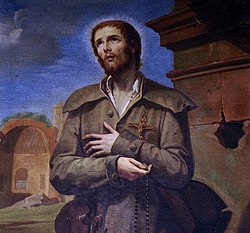Benedict Labre
| Patron Saint of Tramps St. Benedict Joseph Labre, T.O.S.F. | |
|---|---|

A representation of Labre as a sorrowful mendicant.
|
|
| Beggar of Perpetual Adoration | |
| Born |
25 March 1748 Amettes, Artois, Kingdom of France |
| Died | 16 April 1783 (aged 35) Rome, Papal States |
| Venerated in |
Catholic Church (Third Order of St. Francis) |
| Beatified | 20 May 1860, Rome by Pope Pius IX |
| Canonized | 8 December 1881, Rome by Pope Leo XIII |
| Major shrine | Church of Santa Maria ai Monti Rome, Italy |
| Feast | 16 April |
| Attributes | tri-cornered hat; alms |
| Patronage | Unmarried men (bachelors), rejects, mental illness, mentally ill people, insanity, beggars, hobos, the homeless |
Saint Benedict Joseph Labre, T.O.S.F., (French: Benoît-Joseph Labre) (25 March 1748 – 16 April 1783) was a French mendicant, Franciscan tertiary and Catholic saint.
Labre was born in 1748 in the village of Amettes, near Arras, in the former Province of Artois in the north of France. He was the eldest of fifteen children of a prosperous shopkeeper, Jean Baptist Labre, and his wife, Anne Grandsire.
Labre had an uncle, a parish priest, living some distance from his family home; this uncle gladly received him, and undertook his early education for the priesthood. At the age of sixteen, he approached his uncle about becoming a Trappist monk, but his parents told him he would have to wait until he grew older. When Benedict was about eighteen, an epidemic fell upon the city, and uncle and nephew busied themselves in the service of the sick. While the uncle took care of the souls and bodies of the people, Benedict went to and fro caring for the cattle. He cleaned their stalls and fed them; exchanging the life of a farm laborer for that of a student under his uncle's roof. Among the last victims of the epidemic was the uncle himself.
Labre set off for La Trappe Abbey to apply to the Order, but did not come up to their requirements. He was under age, he was too delicate; he had no special recommendations. He later attempted to join the Carthusians and Cistercians, but each order rejected him as unsuitable for communal life. He was, for about six weeks, a postulant with the Carthusians at Neuville. In November 1769 he obtained admission to the Cistercian Abbey of Sept-Fonts. After a short stay at Sept-Fonts his health gave way, and it was decided that his vocation lay elsewhere.
Labre, according to Catholic tradition, experienced a desire, which he considered was given to him by God and inspired by the example of Saint Alexius of Rome and that of the holy Franciscan tertiary pilgrim, Saint Roch, to "abandon his country, his parents, and whatever is flattering in the world to lead a new sort of life, a life most painful, most penitential, not in a wilderness nor in a cloister, but in the midst of the world, devoutly visiting as a pilgrim the famous places of Christian devotion".
...
Wikipedia
